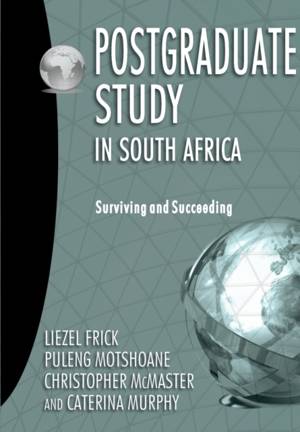
- Afhalen na 1 uur in een winkel met voorraad
- Gratis thuislevering in België vanaf € 30
- Ruim aanbod met 7 miljoen producten
- Afhalen na 1 uur in een winkel met voorraad
- Gratis thuislevering in België vanaf € 30
- Ruim aanbod met 7 miljoen producten
Postgraduate Study in South Africa
Surviving and Succeeding
Omschrijving
Postgraduate Study in South Africa: Surviving and Succeeding is a timely contribution to a growing national discourse on how students navigate higher
education complexities in order to survive and succeed. The current evolving national narrative of emerging student voices that are making themselves heard from within the realms of higher education institutions across South Africa highlights concerns about the lack of higher education transformation around issues of equity, curriculum reform, language and race. This book provides a glimpse of the postgraduate experience amidst these debates. A variety of contextual factors may influence the initiation, development and progress, and eventual outcome of a postgraduate study - whether the student ultimately survives and succeeds. Institutional policies and regulations provide some direction. A myriad of published research literature, self-help guides, online resources, as well as institutional support programmes may provide guidance, while supervisors may provide mentoring and subject-related expertise. Family and friends may share the initial euphoria of the (sometimes first generation) candidate pursuing a postgraduate degree. Many of the authors in the book attest that the value of such contextual influences in supporting the study and, in particular, the student
should not be underestimated. However, the contributors to this book also show us that surviving and succeeding demands more than a contextually rich support system. In fact, students' own self-reflective abilities, creativity and pragmatic approaches to surviving and succeeding are further indicators that postgraduate student success is as much internally as externally determined. The book explores these elements from various thematic perspectives. It builds on the success of similar initiatives focused on postgraduate students' experiences in Aotearoa New Zealand, Australia, the United States of America and the United Kingdom. Although each of the books in this series has its own character and unique national flavour, it highlights the importance of hearing the student's voice above and beyond its potential epistemic and discipline-based contribution. Therefore, each chapter speaks from a uniquely South African perspective. We have tried to remain true to the voice of each contributor, while simultaneously providing a coherent body of scholarly work. We believe this publication may become the catalyst for a continued scholarly debate on surviving and succeeding the postgraduate student's experience in South Africa.
The Editors
Specificaties
Betrokkenen
- Uitgeverij:
Inhoud
- Aantal bladzijden:
- 262
- Taal:
- Engels
- Reeks:
Eigenschappen
- Productcode (EAN):
- 9781928357230
- Verschijningsdatum:
- 1/11/2016
- Uitvoering:
- Paperback
- Formaat:
- Trade paperback (VS)
- Afmetingen:
- 170 mm x 244 mm
- Gewicht:
- 421 g

Alleen bij Standaard Boekhandel
Beoordelingen
We publiceren alleen reviews die voldoen aan de voorwaarden voor reviews. Bekijk onze voorwaarden voor reviews.








